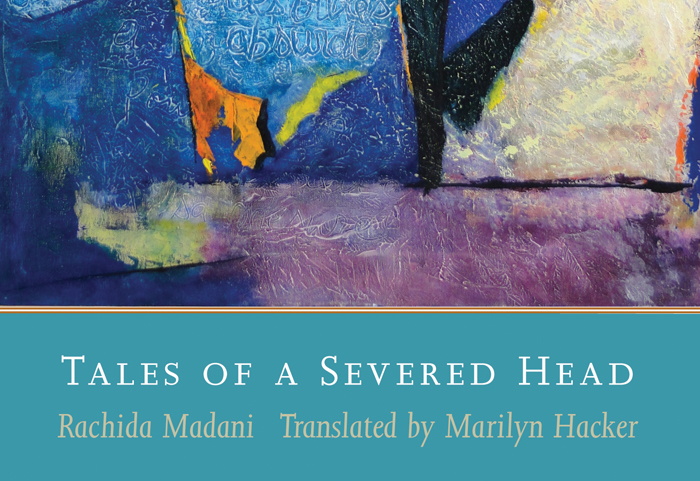Rachida Madani’s Tales of a Severed Head
I am no one
in Shehriyar’s city
I am nothing. But I have words…
 These lines from Moroccan poet Rachida Madani‘s moving collection of poems, Tales of a Severed Head, translated from the French by Marilyn Hacker, reveal the essence of her literary endeavor — to highlight storytelling as an empowering deed for the modern woman seeking to define her role in a world plagued by poverty, corruption, human rights abuse and the lingering effects of colonialism. Madani‘s modern Scheherezade, a protagonist based off of the character of Scheherezade in the classic collection of Arab tales known as “The Thousand and One Nights,” is telling us that words have the power to yield an identity, Scheherezade’s freedom to express herself through telling tales embodying women’s determination to be heard in a perennially male-dominated society. For Madani‘s Scheherezade, as for her ancient counterpart, tale-telling is not just a technique for prolonging her life — it is a way to speak out for herself and for all women, and to convey the importance of construing a self through an original literary voice. Thus, Scheherezade’s captivating tales are powerful enough to both distract king Shehriyar and allow her to channel her broken womanhood. Madani‘s narrative is “the sobbing tale of a shattered woman, the bloody tale of a head severed on the way to revolt.” These lines evoke an inter-generational struggle — the two Scheherezades, though centuries apart, are arguably fighting for the same unresolved cause, which has to do with woman’s role in a world that overwhelms her. Madani‘s notion of language as a weapon resonates throughout the story and renders her collection of poems a tale of contemporary resistance to a century-old problem.
These lines from Moroccan poet Rachida Madani‘s moving collection of poems, Tales of a Severed Head, translated from the French by Marilyn Hacker, reveal the essence of her literary endeavor — to highlight storytelling as an empowering deed for the modern woman seeking to define her role in a world plagued by poverty, corruption, human rights abuse and the lingering effects of colonialism. Madani‘s modern Scheherezade, a protagonist based off of the character of Scheherezade in the classic collection of Arab tales known as “The Thousand and One Nights,” is telling us that words have the power to yield an identity, Scheherezade’s freedom to express herself through telling tales embodying women’s determination to be heard in a perennially male-dominated society. For Madani‘s Scheherezade, as for her ancient counterpart, tale-telling is not just a technique for prolonging her life — it is a way to speak out for herself and for all women, and to convey the importance of construing a self through an original literary voice. Thus, Scheherezade’s captivating tales are powerful enough to both distract king Shehriyar and allow her to channel her broken womanhood. Madani‘s narrative is “the sobbing tale of a shattered woman, the bloody tale of a head severed on the way to revolt.” These lines evoke an inter-generational struggle — the two Scheherezades, though centuries apart, are arguably fighting for the same unresolved cause, which has to do with woman’s role in a world that overwhelms her. Madani‘s notion of language as a weapon resonates throughout the story and renders her collection of poems a tale of contemporary resistance to a century-old problem.
Through her writing, Madani also transcends literary stereotypes. When she writes: “And the train emerges from all directions/it whistles and goes right through the woman/the whole length of her,” Madani does not depend solely on the Freudian dimension of these lines; she succeeds in conveying an utter feeling of helplessness intelligible to any and every woman. The Moroccan writer’s ultimate success lies in universalizing Scheherezade’s otherwise idiosyncratic situation, enabling women around the globe to recognize themselves in her struggle, and men to momentarily perceive themselves as the Other.




